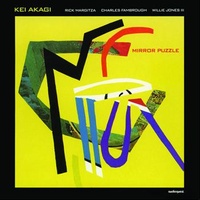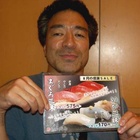I recently met jazz pianist Kei Akagi quite by chance.
My school recently got a distinguished new student, Masao Honma, a Sendai-based classical music composer. He wants to improve his English so he can communicate better with his English-speaking peers. The other teachers said Mr. Honma, despite being middle-aged, was a quick learner. So I wanted to make his acquaintance.
I was impressed by how quickly he picked up new grammar structures. I’d just arrived from a short tour of Tohoku so I recapped it for him; he’s from Aomori, close to Kanagi, novelist Osamu Dazai’s hometown.
We hit it off. I learned more about Mr. Honma, whose wife, Mari, lived in the U.S. for 16 years in Cleveland where her father was a minister at a church for Issei while working on his Ph.D. The fact that there was an Issei community in Cleveland greatly surprised me. I felt a kinship with Mr. Honma since our families shared a similar heritage of sorts.
We began another class by talking about music and the conversation got around to jazz, which I listen to almost exclusively these days. “My brother-in-law is playing a concert next week,” Mr. Honma informs me. He’s shy. Kei, his brother-in-law, had a CD, would I like a copy? I was delighted. “Mirror Puzzle” (Audioquest) is a CD that’s right up my alley since I’ve been listening to a lot of jazz these days; lively modern bebop recording steeped in traditional.
The concert was in an Italian restaurant called “Palinka,” not far from Tohoku University’s Katahira campus. The unusual two-story building was designed in Penticton, B.C., the portly owner, Yasushi Koseki, informs me.
Honma-san apologized for the price of the tickets 7,000 yen, which includes dinner. Not bad, really. Barry Lewis and his wife Mariko joined me. I promised Barry, who teaches English and is also a flamenco guitar player and teacher, that Kei is a pianist who ranks with any of the young jazz pianists I’ve been listening to recently.
Barry, who is from Cheltenham, England is like many people here in Japan who carry the burden of an artistic background; he’s torn between a commitment to music and making pretty good money teaching English. Living in Sendai carries with it a great cost in respect to the arts. Except for a terribly pretentious gaijin artiste coterie of assistant language teachers, there isn’t much of a scene. Most of us remain dilettantes, on the sidelines, a little envious of those who are doing their “thing” full time and professionally.
* * *
Doors opened at 6:30 so we arrived early. The restaurant had a black Yamaha piano at the front of the room. There was seating for about 30 on the main floor and a loft area where Mr. Honma, wife Mari, a classical pianist, family members, and friends were already congregated.
It was easy to spot Kei when he entered the club. He was wearing a moss green T-shirt, jeans, and running shoes. His long pony tail hung on his back and he carried a black shoulder bag. He was relaxed, had an easy smile as he perused those in attendance, then bounding up the stairs to meet his sister, brother-in-law, and friends.
Honma-san came downstairs with Kei and introduced him to our group. He was California complete with laid back attitude and lingo; an amiable dude.
The meal was excellent. It was obvious from looking around that we are the only table in the restaurant drinking wine. After quickly finishing off the complimentary glass, Barry orders a bottle of Chilean, then something French. The audience was polite and reserved, formally dressed like a classical audience. They showed certain appreciation for this return of a prodigal son who made it big.
“He’s not Japanese,” Barry blurts out suddenly, red-faced pissed, turning around towards me. “He’s like you!”
I was taken aback by the bizarre comment. I thought about it later and wondered how well the influences in his music, which were ones I’d also grown up with came through to the rest of the audience? Even Barry, from Cheltenham, England, how well could he relate to the gospel/Motown/blues/funky R&B grooves that are etched into my own musical sensibilities? Perhaps this is what moved my friend to blurt out such a strange statement.
What is “Japanese” anyway? I wondered. Barry’s wife is Chinese Japanese, her family changing their name to Hayashi to complete their assimilation; I am Nikkei; and Kei seems comfortable ensconced in two cultures.
Between sets Kei stops by the table for a chat. He says that he grew up close to the club and remembers when the streets were still dirt and American GIs, still playing beneficent heroes, tossed candy to the kids; even the first TV in a local restaurant. He chats easily about those days.
Kei’s musical background is an impressive one. In addition to playing with Miles Davis, over the past dozen years he’s also played with Stanley Turrentine, Art Pepper, Joe Farrell, Sadao Watanabe, Airto Moreira, Al Dimeola, Allan Holdsworth, among other influential names in jazz.
His sister said although they weren’t forced to study, Kei was the one who never wanted to practice as a youngster. “He was a rebel. He took up jazz instead of classical music.”
He was born in Sendai. At four, the family moved to the Hough district of Cleveland. He began studying piano the following year at the Cleveland Music School Settlement. The music of the Beatles and Motown were important early influences.
Kei spent part of his teen-aged years in Japan where he played in a high school rock band; then went on to the International Christian University in Tokyo where he studied composition and philosophy.
He later enrolled as a graduate student in philosophy at the University of California (Santa Barbara). A few credits short of earning his M.A., he dropped out to play jazz full time with Brazilian artists Airto and Flora Purim in 1979. He worked with them until 1985.
Following this, he played with Joe Farrell, the late great saxophonist:
“Joe kind of became my big brother. He was the first really great, pure jazz musician that I played with on an on-going basis. He taught me a lot about phrasing, chords, all of the really basic stuff that a jazz musician has to know. And he was the greatest guy.”
Kei had listened to Miles Davis since he was 17:
“The influence he had on me was immense. But the two years I spent with Miles reinforced certain ideas I had about music. He was always concerned with moving ahead. He never looked back. Miles was a musician who lived and played for the moment. And that to me is the essence of what jazz should be.”
Kei left the band in 1991. “I was tired of playing those songs (i.e. Michael Jackson’s “Human Nature”) so much. I was ready to go back to my roots as a jazz pianist.”
* * *
Barry and I decided to make the trip to Furukawa Tuesday night to see Kei play in a trio, this time with a drummer, Hiroshi Murakami, and bassist Toshi Suzuki, from Tokyo, two of his musical heroes from his teen-aged days. We caught the 5:43 p.m. Shinkansen (bullet train) to Furukawa, a 45-minute ride by local train, which took a mere 17 minutes by “Shink.”
We found the place without much trouble. Furukawa is a small city, inaka (countryside), like most of Tohoku. The name of the club was “Hana no Yakata,” a classy low-keyed joint with a very friendly proprietor who was sporting a New York Yankees T-shirt for the occasion. The cover charge was another 7,000 yen, with complimentary whiskey (you do get used to the prices, which really are fair considering the clubs are usually so small. The privilege of hearing good music carries with it a premium in Japan).
The long counter bar in a separate room, subdued lighting. Four tables and a long, well-worn leather bench seat stretched across the back of the club where we sat with Honma-san and Mari. Signatures of musicians were scrawled over the walls in black marker. There were maybe 20 people crammed in. The stage was a tight space up front with just enough room for a stand-up bass, drums, and piano.
Live is the only way to listen to music; a small club the best venue. The crowd was more boisterous, taking advantage of nomihodai (all you can drink) whiskey deal. Beside us was a row of slowly unraveling salarymen. One kept shouting “Yeah!” during the break.
When Kei really gets going, he bounces off his seat, shifting around, fingers flying over the keyboard, an amazing technician but an artist who proceeds to levels of expression that are inspiring. Each solo rode on an emotional note that took surprising twists and turns; it was hard to believe they didn’t regularly play together. It was a splendid show.
Since it was now after 11, trains weren’t running so Honma-san kindly offered to drive us back to Sendai in his brand new Volkswagen.
Mari chatted with us on the way back, translating for her husband. Honma-san recently returned from Singapore where he attended the premiere of his new symphony. They were going to Korea next week to attend the premiere of two new works: one chamber music piece which Mari was going to play; the other a flute and harp piece.
Kei was going to play in nearby Ishinomaki and then heading to Tokyo for a week before returning to California. “It’s his only steady source of income,” Mari says with sisterly concern.
He returns to Japan at least once a year. Their father, Tai, lives in Hakkodate, Hokkaido.
A few days later, I telephoned Barry to find out how he enjoyed the show. “I actually woke up tapping my feet. I was humming until noon,” he reported with genuine glee.
We agreed they were two of the best concerts we’ve seen in Japan and vowed to search out experiences like these more often.
*This article was originally published in the Nikkei Voice in September 1997.
© 1997 Norm Ibuki







